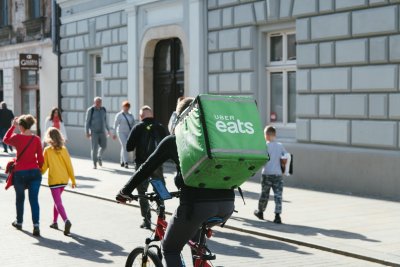The first part of this series introduced three migrant workers engaged in platform-based work: Andrei, José and Mohammed. We briefly discussed the circumstances that led them to move to a different country and the difficulties they faced. In the second part of this series, we explore the factors that motivated them to take up platform labor as well as the various challenges of this form of work.
Motivations for pursuing on-demand platform labor
Relatively quick/easy access to paid work
The relatively low institutional barriers to paid work opportunities formed a major motivation to try out platform-mediated labor for Andrei, José and Mohammed. These low barriers exist not only because platform companies frequently use an expedited, largely automated, and online “hiring” process they call “onboarding”, but also due to how some companies do not strictly enforce formal requirements such as business licenses (which independent contractors need in order to operate), social security numbers, or work permits.
Andrei, who has an EU passport, can find legal employment in the Netherlands without having to worry about whether his employer could sponsor his work permit. Even with these rights, however, the nature of construction work is such that he often had to wait a long time after finishing a job before he could secure another contract. As explained in the previous blog post, Andrei started working for Deliveroo while he was waiting for his next contract to come through (which did not happen). Unlike the construction business, app-based food delivery doesn’t come with these search costs/frictions and after signing up with Deliveroo he could start making money right away.
Both Mohammed and José are undocumented immigrants. As previously mentioned, Mohammed did not have a valid passport from any country and – while his asylum case was being processed – his only means of identification were the travel documents issued by the German government. In these circumstances, it was impossible to find formal employment in Berlin, which led him to take up informal freelance work as a social media marketer. Still, he found that his lack of German language skills hindered his ability to find enough work. Helpling, on the other hand, did not require proficiency in German and neither did the company demand a business license. All they needed was a valid ID and they accepted the documentation he had; five days after he signed up online he could start accepting cleaning offers. Mohammed suspects that Helpling tactically waives the business license requirement in order to attract more workers – those who do not have and/or cannot obtain one. People who do have a proper business license would probably work elsewhere, he thinks.
José did have some initial difficulties in gaining access to platform-based work. He has a tax ID but no social security number, which means that legal employment is not an option for him. Because Relay requires only a tax ID (although they claim to also run a background check), he felt motivated to sign with this company and try his luck. However, to his dismay, Relay took several months to process his application, which indicates that platform companies do not always – or uniformly – offer quick access to income opportunities. (Grubhub, another American platform, was notorious for their selective and sporadic “hiring” practices, only onboarding new couriers during short periods of the year.)
As he was under pressure to supplement his wages from the bagel shop with extra income to provide for his family, he decided to also try Uber Eats, which had a faster onboarding process. However, Uber Eats did require a social security number, which he then decided to forge. He was aware that combining his real bank account number with a fake social security number exposed him to substantial legal risk, and as such he believes that most platform-based work is better suited for documented migrants. Unlike other job applications in his past, he could not ‘sweet-talk’ Uber into empathizing with his situation. In the absence of such human contact in app-based work, the documents he uploaded as part of his onboarding process had to – as he put it – “make the case for him”. José’s story demonstrates that institutional barriers remain ever-present for undocumented workers seeking platform-mediated labor opportunities. Getting access to a platform often entails having to shoulder disproportionate risks by breaking the law, which some platform companies seem to condone especially when they need more workers.
Relative autonomy and flexibility
Another key attraction of platform-based work is the flexibility and autonomy that it offers, or appears to offer, compared to other available jobs. José was overworked and exploited at the bagel place, where his shifts were scheduled by the manager. He had to do tasks that were not previously agreed on (sorting merchandise, stocking, baking bagels) and was not paid extra for the deliveries he did, irrespective of their distance. With platform-based work, he experiences much more autonomy as he can reject incoming orders and gets paid on time (even whenever he wants) without having to chase after his manager. He is able to focus on picking up and dropping off food while the app takes care of the rest. Uber Eats and Relay also enable him to set his own schedule, although – as we will see – Relay makes this freedom contingent on his work performance.
Flexibility is invaluable for Mohammed, who has another job, language classes, and a family. Every week he cleans for three to four regular clients with whom he has established a rapport and who trust him with their housekeys. Therefore, he can let them know personally if he is running a little late or if he wants to reschedule. This allows Mohammed to structure his schedule so that he can compartmentalize his work and his time with his family. While he would have had the same flexibility as a cleaner in the informal market, he prefers working through Helpling because he read that the company provides insurance for any damages he might cause in a client’s home. So far he has never had to use this insurance and he does not know the details regarding the range, terms and conditions of its coverage, but still he would – in his own words – “rather be safer than sorry”.
Meanwhile, Andrei’s life consists mostly of work. He appreciates that Uber Eats allows him to work as much as he wants, which has never been possible in his other jobs. For him, this is a form of autonomy – the ability to maximize your earnings by working as much as possible. App-based food delivery also affords the flexibility to take breaks whenever he wants or to take time off without advance notice if there is a family emergency back in Romania. He trusts that Uber Eats will be there when he returns to Amsterdam and that he will be able to pick up where he left off.
Platform-based work certainly offers more autonomy and flexibility compared to the other kinds of low-wage jobs these three workers could get with their limited education (Andrei and José) and undocumented status (José and Mohammed). Yet this is not to say that Andrei, José and Mohammed have complete control over when and how they work or how much they earn. In the next section, we discuss some ways in which platforms undermine the autonomy and flexibility that they promise to workers.
Challenges and frustrations
Opaque/unfair performance evaluation and access to work
Each platform mobilizes certain metrics intended to evaluate aspects of a gig worker’s performance. Helpling, for instance, has a 5-star rating system that shows cleaners’ average rating on their profiles. The company also used to have a performance score, which was a composite of user feedback on “job quality”, “reliability” (based on how often a cleaner cancels jobs) and “response rate” (how quickly they respond to a new job offer). Mohammed took issue with the “response rate” metric because it is not indicative of how good cleaners are at their job or even how quickly they respond to messages from existing clients. Overall, Helpling workers do not have a say in how their work performance is evaluated and neither do they know the extent to which particular performance metrics affect their visibility on the platform, or their ability to receive new clients. Moreover, there is no possibility for cleaners to rate or review clients, which generates a distinct evaluative asymmetry.
Compared to Helpling, Relay’s performance metrics have a more explicit impact on work opportunity. Relay couriers who consistently work “full time” (around 40 hours a week, according to José) and retain a high rating get priority access to the app’s self-scheduling tool. When their rating drops and/or they work fewer hours, they lose this privilege and consequently won’t be able to claim preferred shifts for the upcoming week – if they can claim any shifts at all during busy periods. While Uber Eats has a free login policy, meaning that anyone can log into the app and work at any time, José suspects that the platform gives priority to couriers with better ratings (in the form of “thumbs up/down” evaluations) when allocating orders. Accordingly, José – who, like many other couriers, has other jobs and care responsibilities – constantly needs to be at his best in order to retain a steady, reliable flow of income, even though it is not always fully clear how this “best” is measured or what the evaluative thresholds and their impacts are on different platforms.
Andrei elaborated on the pressure he used to feel when he was dependent own Deliveroo’s self-scheduling system, which assigns tiered access on the basis of couriers “statistics”. On the Deliveroo platform, a courier’s statistics consist of the following metrics: session attendance rate, late session cancellation rate (within 24 hours in advance), and peak attendance rate (6-8pm, Fri-Sun). Couriers who log in late, log out early, or fail to show up for a session (due to illness or an emergency) without cancelling at least 24 hours in advance take a hit on their statistics and will consequently be granted later access to the scheduling tool. This means that, once they get back to work, they will have fewer work opportunities and are often left picking up the sessions that other couriers occasionally drop. Again, this becomes a particularly serious issue during times when Deliveroo hires many new couriers – usually in the fall and winter times. The “cold objectivity” of the algorithmic control exerted through these evaluative metrics leaves no room for slip-ups, accidents, or temporary setbacks; you’re only as good as your most recent week’s job performance.
While Uber Eats does not deploy a self-scheduling system, Andrei echoed José’s suspicion that couriers with a better rating are assigned more orders in the platform. Like José, however, he has no way of substantiating this notion, which is based on a mix of personal experience and rumors. In contrast, he knows for sure that cancelling accepted orders too frequently will get him locked out of his account while Uber places it “under review”. This disciplinary policy, which can be enforced for up to three days, severely impacts his ability to work and secure a livelihood and stands in sharp contrast to the “freedom” associated with working for Uber Eats.
Dynamic wage setting and income instability
A common theme in all three interviews was the struggle to maintain a stable income from platform-mediated work. We have already discussed how the three men’s ability to get access to jobs is conditional on how their work performance is evaluated. Additionally, platforms also make frequent changes to how wages and incentives are determined, which makes it difficult for gig workers to anticipate how much they will be able to earn through a platform in a given week – or even per hour.
For Andrei, Deliveroo’s shift from a flat fee per delivery to a distance-based pay model was promising, as he expected to get paid more for longer delivery distances. However, he quickly found out that Deliveroo provided no information about how it calculates payouts. By the time he was booted from the platform, he had been noticing lower fees and his weekly earnings were becoming more unstable. Although Uber Eats also deploys a distance-based pay system, he finds the company more “professional” because it is more transparent with respect to how delivery fees are calculated. He also appreciates the company’s bonus incentives whenever there is high demand and/or inclement weather. In NYC, however, José found it fishy that these bonuses regularly seemed to slip out of his reach. When Uber Eats advertised a bonus for completing x orders within a certain time frame, he would suddenly stop receiving orders right before he was about to meet his bonus target. Again, he suspects this may be intentional but to his frustration he has no way of proving what remains a feeling of mistrust.
Relay, in contrast, offers hardly any bonus incentives and instead pays an hourly wage of just $8.50 before taxes. José’s strategy on this platform is to accept as many orders as possible, so that he earns a substantial amount in tips on top of his meagre hourly wage. Although Uber Eats pays an average of $4 per delivery, fetching him more money per hour, the inability to find enough work on the platform motivated him to concentrate on Relay. Instead of waiting around for orders to come in via Uber Eats, he prefers to deliver a large volume of orders in the hours he works with Relay, which allows him to maximize his tip money and spend the remaining time with his family. However, José has also noticed that sometimes the receipt for a big order would list a $10 customer tip that he never received from Relay. The company did rectify such discrepancies when he brought it to their attention, but he is also wary of pressuring them too often because he is afraid that they might throw him off the platform.
In Mohammed’s case, Helpling does not determine cleaners’ wages. Instead, the company implemented a system that offers them the ability to set their own hourly rate. Clients can see an array of cleaner profiles on the platform and select the someone on the basis of their credentials (ratings, reviews) and this hourly rate. While this arrangement seems to offer more wage-setting autonomy, Mohammed insists that Helpling nudges cleaners to keep their hourly rate relatively low in order to remain competitive – realizing that their profiles are made easily comparable for the company’s discerning (and frugal) client base. Rather than lowering his rate to attract new clients and thereby compromising his earnings, his strategy is to retain his existing clients.
Andrei, José and Mohammed continually have to strategize in order to secure a somewhat stable income, but do so in different ways and to different degrees. For Andrei and José, this entailed moving to a different platform, while Mohammed focuses his efforts on the stabilizing opportunities of app-based cleaning. It should be highlighted here that app-based cleaning offers a relatively more reliable work routine and source of income compared to food delivery, given that cleaners can build up a portfolio of regular clients. This makes it easier for them to schedule ahead and to estimate how much they will earn in a week. Once they have enough recurring appointments set up, they rarely look for one-off cleanings - which introduce a measure of contingency many cleaners - including Mohammed - seek to avoid when possible.
In the next and final instalment of this series, we will discuss some other challenges these three workers face, while also attending to their ideas about what comes after platform labor - to the extent that their horizon reaches this far.


